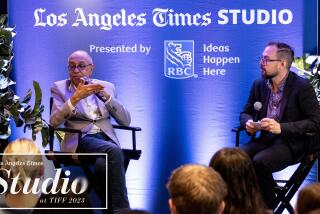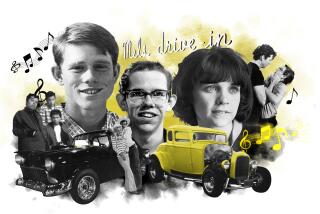Those Little Rugrats Are in Paris? Oui, Wee
- Share via
In the history of American cinema, sequels that match or surpass the quality of their predecessors are not unheard of. Many critics preferred “The Empire Strikes Back” to “Star Wars.” “The Godfather, Part II” is always ranked right alongside the first installment. And despite a seven-year gap between them, “Aliens” showed no stylistic drop-off from “Alien.”
Alas, “Rugrats in Paris--The Movie” does not fall into this category.
This will matter not one lick to 6-year-olds. Plots just don’t seem obvious to first-graders. They generally don’t complain, later, over a grande apple juice, “You know, I didn’t think Coco LaBouche was a fully developed character.” They will be mostly entertained for most of the movie’s 80 minutes and leave the theater shouting, “Who let the dogs out? Woof! Woof-woof! Woof-woof!”--the song used in the movie (and just about everywhere else in the world).
So the rest of this is not for our first-grade readers, but for their guardians who are wrestling with options: Take the kids myself, pawn them off on some friend’s parent, or hold out for the video.
“The Rugrats--The Movie”--a $100-million hit in 1998--had a certain charm. Much like a newspaper comic strip, it viewed everyday life through the eyes of babies. Tommy Pickles (voiced by E.G. Daily), age 1, and his diaper-donning crew tried to rustle him up a baby sister. He wound up with a bawling baby brother instead, who was such a pain that the Rugrats tried to take him back. It was tightly plotted with a lot of action and a nice message about the responsibility of being a big brother. The TV show had been on Nickelodeon since 1991, yet the movie worked so well that one would believe the series was spun off the film.
“Rugrats in Paris--The Movie,” on the other hand, feels like a half-hour TV show inflated into a feature film. The prominent placement of the Baha Men’s song “Who Let the Dogs Out,” is a completely tangential sequence. About half the running time is spent setting up why the Rugrats and their families are in Paris, how they got there, and who the new characters are.
The emotional thread is 2-year-old Chuckie (Christine Cavanaugh, who was also the voice of “Babe”) and his quest to find a new mommy to marry his widowed father. For some reason this takes place in a Japanese-style theme park--Reptarland, based on a toy by Tommy’s dad--in Paris.
Cold, calculating Coco LaBouche (voiced by Susan Sarandon) runs the park with assistance from the unscrupulous Jean-Claude (John Lithgow) and the kind Kira (Julia Kato). To get a promotion in her kid-oriented business, Coco plots to acquire an instant family: Chuckie and his dad, Chas (Michael Bell).
Yet for all the machinations and theme-park attractions, the plot doesn’t cover much ground. The babies still speak in amusing malapropisms--”over my dad’s potty” for “over my dead body”--but this Parisian edition offers few observations that will be clever to parents. The animation itself is unremarkable; the hand-painted and the computer-generated parts sometimes don’t blend well.
But the appeal of “Rugrats” was never based on the quality of its animation, and all of this film’s faults are nearly forgiven for the short but memorable scene of sumo wrestlers singing a karaoke version of “Bad Girls.” Fortunately, the lyrics for that Donna Summer song will probably go over 6-year-old heads.
* MPAA rating: G. Times guidelines: lots of potty humor; young child deals with mother’s death.
‘Rugrats in Paris--The Movie’
E.G. Daily: Tommy Pickles
Christine Cavanaugh: Chuckie Finster
Susan Sarandon: Coco LaBouche
Cheryl Chase: Angelica Pickles
Michael Bell: Chas Finster
John Lithgow: Jean-Claude
A Klasky/Csupo production. Distributed by Paramount Pictures and Nickelodeon Movies. Directors Stig Bergqvist and Paul Demeyer. Producers Arlene Klasky and Gabor Csupo. Executive producers Albie Hecht, Julia Pistor, Eryk Casemiro and Hal Waite. Co-producers Tracy Kramer, Terry Thoren and Norton Virgien. Screenplay J. David Stem & David N. Weiss and Jill Gorey & Barbara Herndon and Kate Boutilier. Editor John Bryant. Voice director Charlie Adler. Composer Mark Mothersbaugh. Music supervisor George Acogny. Running time: 1 hour, 20 minutes.
In general release.
More to Read
Only good movies
Get the Indie Focus newsletter, Mark Olsen's weekly guide to the world of cinema.
You may occasionally receive promotional content from the Los Angeles Times.







